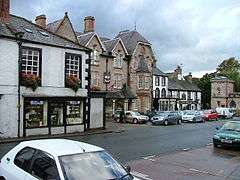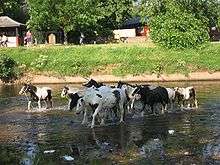Appleby-in-Westmorland
Appleby-in-Westmorland, a market town and civil parish in the Eden district of Cumbria, England, had a population was 3,048 at the 2011 Census.[1] Traversed by the River Eden, Appleby is the county town of the historic county of Westmorland. It was known simply as Appleby until 1974, when its council of the successor parish to the borough, changed its name to preserve the name Westmorland, which had been disappeared with the county under the Local Government Act 1972.[2] It lies 13.7 miles (22 kilometres) south-east of Penrith, 32.2 miles (52 kilometres) south-east of Carlisle, 27.2 miles (44 kilometres) north-east of Kendal, 45.2 miles (73 kilometres) west of Darlington and 61.2 miles (98 kilometres) west of Middlesbrough.
| Appleby-in-Westmorland | |
|---|---|
 Boroughgate (2004) | |
 Appleby-in-Westmorland Location within Cumbria | |
| Population | 3,048 (2011) |
| OS grid reference | NY6820 |
| Civil parish |
|
| District |
|
| Shire county | |
| Region | |
| Country | England |
| Sovereign state | United Kingdom |
| Post town | APPLEBY-IN-WESTMORLAND |
| Postcode district | CA16 |
| Dialling code | 017683 |
| Police | Cumbria |
| Fire | Cumbria |
| Ambulance | North West |
| UK Parliament | |
| Website | http://applebytown.org.uk/ |
History
St Lawrence's Parish Church is recorded in the National Heritage List for England as a designated Grade I listed building.[3] Appleby Castle was founded by Ranulf le Meschin in the early 12th century. The Borough of Appleby was founded by a royal charter in 1179 and its Moot Hall built about 1596.[4] Surviving timbers in the roof were felled between 1571 and 1596.[5] In the Second English Civil War Appleby was placed under a siege, in which the Regicide Major General Thomas Harrison was wounded.[6]
Appleby Grammar School dates back to two chantry bequests in 1286.[7] It was incorporated by Letters Patent of Queen Elizabeth in 1574.[7] George Washington's father and two half-brothers, born in Virginia, were educated at Appleby Grammar School. He would have followed, but in 1743, when he reached the age at which the two older boys had made the voyage, his father died suddenly.[8]
Economy
Appleby is overlooked by the privately owned Appleby Castle, a largely Norman structure that served as home for Lady Anne Clifford in the 17th century. Appleby's main industry is tourism, due to its history, remoteness, scenery, and proximity to the Lake District, the North Pennines, Swaledale and Howgill Fells.
From 1973, Appleby Castle was the headquarters of Ferguson Industrial Holdings Plc.[9][10][11] WA Developments Limited, now Stobart Rail Limited, was long based in Appleby as a civil engineering company founded by Andrew Tinkler and William Stobart and specialising in railway maintenance.[12]
Appleby's economy is based mainly on the service sector, through small businesses, restaurants and pubs. The private businesses include butchers, grocers, bakers and newsagents.[13] Appleby Creamery makes premium and hand-made cheeses, including Eden Valley Brie [14].
Events

Appleby and surrounding villages host long-established events such as Warcop rushbearing, dating back to at least 1716[15] and the four-day Appleby Horse Fair on the first weekend of June,[16] of which the earliest known record is a 12th-century charter from King Henry II of England.
Appleby Agricultural Society, founded in 1841, hosts an annual agricultural show.[17] More recently the town has held an annual themed carnival. Other events are described in the community website.[18]
Governance
Appleby was a parliamentary borough from medieval times electing two Members of Parliament. By the 18th century it was a pocket borough, whose members were effectively in the gift of the Lowther family. They included William Pitt the Younger, who was MP for Appleby when he became Prime Minister in 1783, though he stood down in the next general election in favour of a Cambridge University seat.
A later Appleby member was Viscount Howick, later (as Earl Grey) the Prime Minister under whom the Great Reform Act of 1832 was passed, but that did not save it from losing both members under the Act. As the only county town disenfranchised, Appleby was a controversial case in the debates on the Reform Bill, where the opposition attempted vainly to amend the bill and save it at least one MP. It gained a new charter in 1885.[19]
The town remained a municipal borough until such a status was abolished under the Local Government Act 1972. It was superseded by Eden district, based in Penrith. Despite this, it remained smaller in size and population than most urban districts, although with a larger population than some early Westmorland urban districts such as Grasmere and Shap.
Appleby was the county town of Westmorland. The Assize Courts met there, but the former county council sat in Kendal.
Present day
Appleby today is in the parliamentary constituency of Penrith and the Border. Neil Hudson was elected its Conservative Member of Parliament at the 2019 General Election, replacing Rory Stewart. While the UK remained in the European Union, Appleby was in the North West England European Parliamentary Constituency.
For Local Government purposes it bridges both the Appleby and Bongate wards of Eden District Council and the Appleby Ward of Cumbria County Council. Its own parish council is known as Appleby-in-Westmorland Town Council.[20]
Transport
Appleby railway station on the Settle-Carlisle Line was opened by the Midland Railway in 1876. Appleby East station, built by the North Eastern Railway was nearby. The former remains, but the latter was closed in 1962, although it retains the potential for connection to the Eden Valley Railway.
Notable people
A chronological list of notables from Appleby with a Wikipedia page:
- Thomas Barlow (1607/1608–1691), an English academic and clergyman who became Provost of Queen's College, Oxford and Bishop of Lincoln, was born at nearby Orton and attended Appleby Grammar School.
- Lady Anne Clifford (1590–1676), played a big part in shaping Appleby by restoring the castle and refurbishing the churches. Her memorial stands beside her mother's in St Lawrence's Church, Boroughgate, where both are buried.
- Gavin Skelton (born 1981), football coach
- Helen Skelton (born 1983), television presenter, attended Appleby Grammar School.
- William Stobart (born 1961), director and shareholder of Appleby based WA Developments Ltd
References
- "Parish population 2011" (PDF). Eden District Council. Retrieved 5 February 2019.
- Kelner, Simon (23 April 2013). "Eric Pickles's championing of traditional English counties is something we can all get behind". The Independent.
- Historic England. "Parish Church of St Lawrence, Appleby-in-Westmorland (1312067)". National Heritage List for England. Retrieved 24 June 2012.
- Barter, Elsworth (2018). "The Moot Hall, Appleby-in-Westmorland: An Architectural Investigation and Assessment of Significance. Historic England Research Report 25/2018". research.historicengland.org.uk. Retrieved 10 May 2020.
- Arnold, Howard, Tyers (2018). "Moot Hall, Boroughgate, Appleby-in-Westmorland, Cumbria: Tree-ring analysis and radiocarbon dating of oak timbers. Historic England Research Report 14/2018". research.historicengland.org.uk. Retrieved 10 May 2020.CS1 maint: multiple names: authors list (link)
- Maurice Ashley (1954), Cromwell's Generals, London: Cape, OCLC 798976, OL 6150316M
- Higginson, J. H. (1976). "Reviewed Work: Appleby Grammar School by Edgar Hinchcliffe". British Journal of Educational Studies. 24 (1): 98–99. doi:10.2307/3120766. JSTOR 3120766.
- "George Washington and Appleby Grammar School". Cumberland and Westmorland Herald. 25 September 2009. Retrieved 5 February 2019.
- "Industrialist who first opened Appleby Castle". Cumberland and Westmorland Herald. 26 October 2002.
- Hurst, John (2000). Come Back to Eden: Lakeland's Northern Neighbour. Sigma Leisure. ISBN 9781850587057.
- Holmes, Martin (1974). Appleby Castle. Ferguson Industrial Holdings Ltd, Newcastle upon Tyne.
- "2,000 job companies prepare to quit Eden". Cumberland and Westmorland Herald. 21 January 2006.
- http://visitappleby.com/shopping/
- Appleby Creamery.
- Willcock, Richard (14 November 2015). "Episodes from Rushbearing at Musgrave and Warcop".
- "Appleby Horse Fair". Retrieved 13 September 2019.
- de Silva, Carrie (2013). "A Short History of Agricultural Education and Research". Newport, Shropshire, UK: Harper Adams University. Cite journal requires
|journal=(help) - "Appleby and Eden Valley Events: What's on in Appleby-in-Westmorland". Retrieved 13 September 2019.
- "Appleby" in Chambers's Encyclopædia. London: George Newnes, 1961, Vol. 1, p. 491.
- "Appleby-in-Westmorland Town Council".
External links
| Wikimedia Commons has media related to Appleby-in-Westmorland. |
| Wikivoyage has a travel guide for Appleby-in-Westmorland. |
| Wikisource has the text of the 1911 Encyclopædia Britannica article Appleby. |
- Cumbria County History Trust: Appleby (nb: provisional research only - see Talk page)
- Appleby-in-Westmorland Society's picture archive updated weekly
- Town Council and Tourist Information Centre